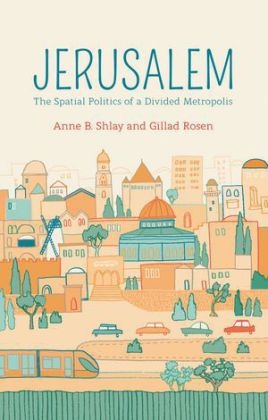Read more
Jerusalem has for centuries been known as the spiritual center for the three largest monotheistic religions: Judaism, Christianity and Islam. Yet Jerusalem's other-worldly transcendence is far from the daily reality of Jerusalem, a city bombarded by conflict. The battle over who owns and controls Jerusalem is intensely disputed on a global basis. Few cities rival Jerusalem in how its divisions are expressed in the political sphere and in ordinary everyday life.
Jerusalem: The Spatial Politics of a Divided Metropolis is about this constellation of competing on-the-ground interests: the endless set of claims, struggles, and debates over the land, neighborhoods, and communities that make up Jerusalem. Spatial politics explain the motivations and organizing around the battle for Jerusalem and illustrate how space is a weapon in the Jerusalem struggle. These are the windows to the world of the Israel-Palestine conflict.
Based on ninety interviews, years of fieldwork, and numerous Jerusalem experiences, this book depicts the groups living in Jerusalem, their roles in the conflict, and their connections to Jerusalem's development. Written for students, scholars, and those seeking to demystify the Jerusalem labyrinth, this book shows how religion, ideology, nationalism, and power underlie patterns of urban development, inequality, and conflict.
List of contents
Figures and Tables vi
Acknowledgments viii
Map of Central Jerusalem x
1 Introduction: The Politics of Space 1
2 The Jerusalem Story: Theory and Methods 18
3 What Is Jerusalem? 40
4 Who Is Jerusalem? 89
5 The Palestinian Challenge and Resistance in Arab Jerusalem 137
6 Downtown Place Making and Growth in Israeli Jerusalem 164
7 Conclusion 185
Notes 195
References 197
Index 211
About the author
Anne B. Shlay is Professor and Chair of the Department of Sociology at Georgia State University, and past Chair of the Community and Urban Sociology Section of the American Sociological Association
Gillad Rosen is Lecturer in Geography at the Hebrew University of Jerusalem
Summary
Jerusalem has for centuries been known as the spiritual center for the three largest monotheistic religions: Judaism, Christianity and Islam. Yet Jerusalem s other-worldly transcendence is far from the daily reality of Jerusalem, a city bombarded by conflict.
Report
"Jerusalem is the main obstacle and battlefield in the Israeli-Palestinian conflict. As advisor to Prime Minister Ehud Barak at the 2000 Camp David Summit, I can testify that this was the main reason why the talks failed. This book by two excellent scholars is an excellent introduction for anyone who wants a deep understanding of the Israeli-Palestinian conflict and what is happening politically on the ground in Jerusalem."
Moshe Amirav, The Hebrew University Jerusalem
"Jerusalem introduces the city as a battleground where the usual conflicts over land and housing cannot be separated from contested citizenship of residents and broad issues of class and ethnic inequality that appear most concretely at the local scale. Jerusalem is at the same time a neoliberal city, a divided city, and a postcolonial city, and Shlay and Rosen skillfully show how the theories associated with each of these depictions can be used to interpret its development."
John Logan, Brown University

